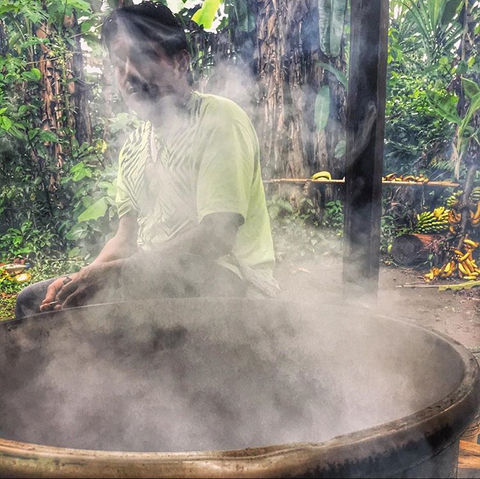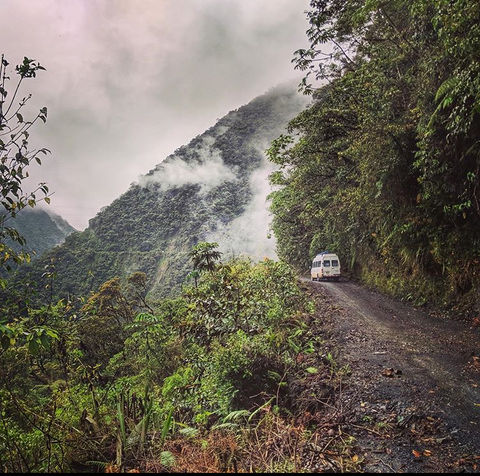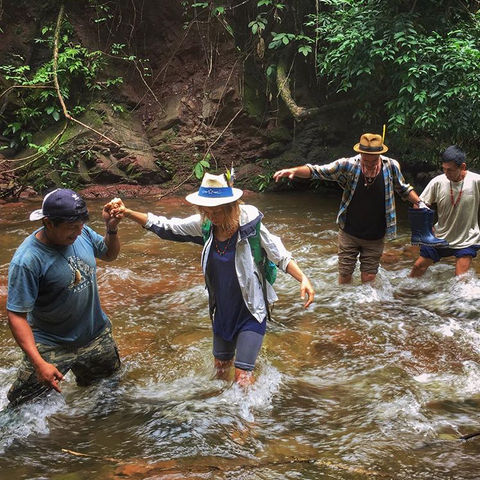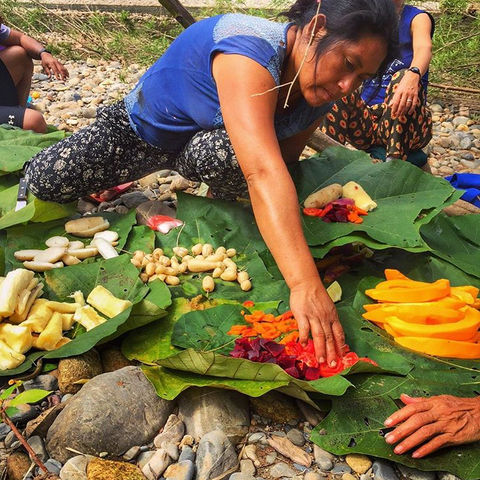

CEREMONIAL WORK
The Ayahuasca at Parign Hak is brewed exclusively with the sustainably cultivated yellow Ayahuasca Vine (Banisteriopsis Caapi) and sustainably cultivated Chacruna leaves (Psychotria Viridis). There are no other admixtures in our Ayahuasca brew.
Ceremonial work at Parign Hak follows the Shipibo tradition but unfolds within the cultural context of the Harakbut people, and the unique natural environment of the Amazonian mountain rainforest between the Manu Biosphere Reserve and the Amarakaeri Communal Reserve. Cleansing and healing work in ceremony brought about by Ayahuasca will go hand-in-hand with traditional icaros (shamanic chants) that are sung both for the group as a whole and for individual participants. Tobacco smoke (mapacho cigarettes and pipes) and agua de florida (perfume) are used as well in ceremony for various purposes.
Please note that our approach to the work both inside and outside of ceremony is strictly therapeutic. Because our ceremonial work began initially with Shintuya community members and Harakbut leaders, and because Parign Hak is an indigenous initiative, we will always admit local community people into our ceremonies, whenever the need or desire to participate is expressed.
We purposefully limit the number of retreat participants to a maximum of six. The small group size will ensure that our hosts are comfortable with the visitors, and also will ensure that each participant receives as much personal attention as possible during ceremony and throughout the retreat. The ceremony leader is a woman, and we guarantee the physical integrity of every one of our participants. The morning after each ceremony, we have an integration circle and offer personal debriefs throughout the day, as needed. This is aimed at assisting participants as much as possible in their individual holistic cleansing, healing and learning process and in their personal development and spiritual growth. We explicitly ask recreational Ayahuasca users to abstain from participating.
THE JOURNEY TO PARIGN HAK
ITINERARY
PARIGN HAK - TRADITIONAL AMAZONIAN MEDICINE IN MANU 8D/7N - All Inclusive (for 2025)
$1,895 USD
Day 1:
Cusco - Shintuya - ¨Parign Hak¨ retreat center
Departure from Cusco in private transportation at 6 a.m. We will drive through a number of Andean communities before a brief stop at the colonial village of Paucartambo. We continue to the Southern tip of Manu National Park, the pass of Acjanaco (3500 m.a.s.l.), from where we start our descent into the Amazon basin. As we travel through elfin and cloud forest, we may spot some birds along the road. We continue our road trip through a number of small colonist settlements and get to the native community of Shintuya, the home to about 250 Harakbut people, in the early afternoon. From here, our Parign Hak hosts will take us downriver to their place in a motorized canoe. After installing ourselves on site and having dinner, we will do a first evening gettogether with our host family and enjoy a well deserved rest in the individual cabins surrounded by the sounds of the night in mountain rainforest.
L,D
Day 2:
Parign Hak
This morning we will do a walk on the nearby trails and visit our ceremonial place (maloca). For those recommended, we will spend the rest of the morning doing plant-based purges in preparation for our first Ayahuasca ceremony in which local community people may participate. In the afternoon we will get together in a pre-ceremonial preparation circle for our first Ayahuasca ceremony where we will go through all important do's and don'ts, state intentions and answer any unresolved questions participants may have. From today onwards, before bedtime or ceremony, each participant will receive a plant bath tailored to individual needs. 1st Ayahuasca ceremony.
(B),L
Day 3:
Parign Hak:
In the morning after breakfast, we will have an integration circle where we can share and help process our experience of the previous night. Most of this day is set aside for rest, documentation and integration of the ceremonial experience. There will be time for an optional plant bath or plant-based steam bath provided by Steve. In the afternoon we will do another "storytelling time" with our hosts and learn more about the history of the Harakbut people.
B/L/D
Day 4:
Parign Hak:
Today we spend the morning on a slow immersive guided walk through the forest to test and expand our newly acquired skills in direct communication with the plant world. Participants learn about the local medicinal plants, through direct lessons in ethnobotany. The afternoon is free for rest and preparation for our second Ayahuasca ceremony.
B/L
Day 5:
Parign Hak → Aguas Calientes:
In the morning we will have another integration circle where we can share and process our experience of the previous night. In the afternoon we travel by boat to the nearby hot springs, Aguas Calientes, to have a relaxing bath under the forest canopy. After dinner a talk about the current challenges of the Harakbut people and their experience with traditional plant medicine is planned.
B/L/D
Day 6:
Parign Hak:
After breakfast we will head out onto the big river (Upper Madre de Dios) to the nearby confluence of the Serjali River. We walk upriver until we find a space to set up camp to swim, watch birds and other wildlife, go fishing and enjoy the beauty of the natural rainforest environment. A traditional Harakbut picnic lunch is cooked and served on the beach. This afternoon is again free for rest and preparation for our third Ayahuasca ceremony.
B/L
Day 7:
Parign Hak:
After breakfast and our post-ceremonial integration circle, we spend the rest of the day resting, integrating and spending social time with out hosts. This day is left free for participants to process the third ceremony and the retreat.
B/L/D
Day 8:
Parign Hak → Shintuya → Cusco:
After breakfast we return by boat to the community of Shintuya where our driver will pick us up, and return us to Cusco. This trip back up the Andes is another opportunity to see more plants, wildlife and stunningly beautiful landscapes. We arrive back in Cusco around 7 p.m that night, depending on road conditions.
B/L
Post retreat
For a practical and successful integration of insights gained and lessons learned during a retreat into your daily life, it is of utmost importance to count on a supportive social network back home. Without it, the chances that such integration may not happen is high. We advise our retreat participants to make sure before signing up, that said network is present for when it's time to do your personal homework after a retreat, so that positive changes can be made lasting.
Included:
- Private transportation Cusco → Queros → Shintuya → Parign Hak → Cusco
- All river transportation
- One overnight in the Queros community lodge (double ocuppancy)
- All other overnights in small cabañas (double occupancy)
- All meals as indicated in the itinerary
- Drinking water
- Bilingual guide (English/Spanish) and cultural facilitator
- 3 Ayahuasca ceremonies
- Plant baths or plant-based steam baths upon request
- Integration circles
- Individual post-ceremonial debriefs/integration assistance for up to three months post-retreat.
Not included:
- Additional food items (cookies, etc.)
- Personal expenses for crafts
- Tips
Important note:
This itinerary unfolds within the natural and cultural environment of an Amazonian indigenous people, the Harakbut (Wachiperi and Amarakaeri subgroups). It is as much a trip for holistic cleansing, healing and learning about ourselves as it is for learning about and from this unique rainforest culture and the natural mountain rainforest environment.
Our indigenous hosts at “Parign Hak” (Grandma´s Home) are the owners and initiators of the facilities and nearby “Mini-hospital Majeno” (the ceremonial space). Because “Parign Hak” is much more of a native family home than a retreat center, installations are rather rudimentary. Our hosts are Shintuya community members and will provide basic lodging (double cabins with beds and mosquito netting). There are no flush toilets but latrines are located near the cabins and near the ceremonial space. River baths or cold showers are available as well. Our hosts cook the meals using their own produce (bananas, plantains, papaya, manioc and other rainforest crops) and river fish as much as possible, but we bring fresh vegetables with us, too. Dietary restrictions and allergies can be accommodated for but must be disclosed in advance.
Among Harakbut people, time runs at a different pace and their outlook on "reality" in general is unique. It is required from all visitors that they bring a high degree of openness, respect and interest in local Amazonian culture and traditions. We welcome participants with an open-mind towards new ways of thinking, perceiving and living, who not only wish to work with Ayahuasca, but also learn from and about the Harakbut people and this rainforest environment. It is required that all visitors respect a code of behavior that will be elaborated on by our hosts and presented upon arrival at the places we visit.
On COVID -19
At Parign Hak, we consider the pandemic to be over. No vaccines or masks are required for your participation.
Recommended items to bring:
- Bathing suit
- Towel
- Biodegradable soap
- Insect repellent (Deet based – natural ones are preferred but may not be as effective)
- Sunglasses
- Cap or hat for sun protection
- Sunblock
- Light, loose-fitting cotton clothing (long pants/long sleeves)
- Rain poncho/jacket
- Dry bag for clothes/electronics
- Sandals
- Hiking shoes
- Rubber boots (high ones that go all the way up to the knee)
- Flashlight and spare batteries
- External battery pack and/or solar charger– there is no electricity for recharging cameras or phones
- Camera
- Binoculars
- Notebook and pens
- Personal fist aid kit (with essentials like antihistamines, band aids, antibiotic ointment etc.)
- Pictures and stories to tell from home
Little gift items like additional fruit and vegetables, or school supplies for the community are optional but always appreciated. Anything that you may not want to take backh ome like repellent or toilettry items or clothes, flashlights or any solar devices are also very much appreciated.












































